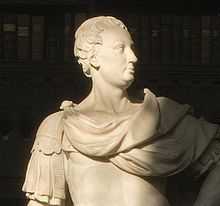Christopher Codrington
Christopher Codrington (1668 – 7 April 1710), was a Barbadian-born British soldier, plantation and slave owner, bibliophile, and colonial governor.
Life

Christopher Codrington was born in Barbados in 1668. His father (also Christopher Codrington) was captain-general of the Leeward Islands. As a young man, Codrington was sent to England to be educated, and went to school in Enfield under the tutelage of Dr. Wedale. From 1685 he attended Christ Church, Oxford as a gentleman commoner. He was elected to All Souls as a probationer fellow in 1690. He was an enthusiastic book-collector. [1]
In 1694, while retaining his fellowship, he followed William III of England to Flanders. Having fought with distinction at Huy and Namur, he was made a captain of the 1st regiment of foot guards in 1695. [1]
In the same year, he accompanied the king to Oxford and, in the absence of the public orator, was selected by the University to deliver the university oration. "Mr. Codrington of All Souls," says Dr. Gibson (afterwards Bishop of London), "in a very elegant oration expressed the publick joy of the university to see his majesty." Codrington had by this time acquired the reputation of a wit and scholar, though his fame is rather to be inferred from the dedications addressed to him by Thomas Creech, Dennis, and others, than from documented performances on his part.[1]
In 1698, after the peace of Ryswick, his father seems to have died, and King William gave him the succession to his father's office of captain-general and commander-in-chief of the Leeward Islands.[2][1]
As a governor his rule does not seem to have been wholly popular, since in 1702 an appeal was made against his behaviour by the inhabitants of Antigua. This document, which is still to be seen in the Codrington Library at All Souls with his comments attached, was ultimately laid before the House of Commons, by whom it was summarily dismissed. When, in the beginning of Anne's reign, war broke out again with France and Spain, Codrington's first military operations as captain-general were successful. But in 1703 the expedition against Guadeloupe took place, which was a failure. After this he resigned his governorship, and retired to his estates in Barbados, passing the remainder of his life in seclusion and study, chiefly of church history and metaphysics.[1]
Will
He died on 7 April 1710, and his body was brought to England and buried on 19 June following in All Souls Chapel. By his will dated 1702 he left £10,000, and £6,000 worth of books to the college, a legacy which sufficed to erect, furnish, and endow a magnificent library, in the middle of which stands his statue by Sir Henry Cheere. He also left £20. for his own gravestone and £1,500. for a monument to his father in Westminster Abbey.[1]
His two estates in Barbados, now known as the Society and the College, together with part of the island of Barbuda, he left "to the Society for the Propagation of the Gospel in Foreign Parts for the foundation of a college in Barbadoes,"[3] in which a convenient number of professors and scholars were to be maintained, "all of them to be under the vowes of poverty, chastity, and obedience," and "obliged to study and practice physick and chirurgery, as well as divinity, that by the apparent usefulness of the former to all mankind they may both endear themselves to the people, and have the better opportunity of doing good to men's souls, while they are taking care of their bodies." The monastic intention of the testator has been lost sight of, but Codrington College, built 1714-42, still flourishes. The present principal (1887) is the Rev. Alfred Caldecott, brother of the artist Randolph Caldecott.[1] The Codrington School - The International School of Barbados, an IB World School named after Christopher Codrington is located in the Society area in the site of the former Codrington School opened in 1917.
References
- ↑ 1.0 1.1 1.2 1.3 1.4 1.5 1.6 Dobson 1887.
- ↑ See transcript of his father Christopher Codrington's will, written & proved in 1698
- ↑ See transcript of Christopher Codrington's will.
- Attribution
- (
 This article incorporates text from a publication now in the public domain: Dobson, Henry Austin (1887). "Codrington, Christopher". In Stephen, Leslie. Dictionary of National Biography 11. London: Smith, Elder & Co. pp. 203–204.
This article incorporates text from a publication now in the public domain: Dobson, Henry Austin (1887). "Codrington, Christopher". In Stephen, Leslie. Dictionary of National Biography 11. London: Smith, Elder & Co. pp. 203–204.  This article incorporates text from a publication now in the public domain: Chisholm, Hugh, ed. (1911). Encyclopædia Britannica (11th ed.). Cambridge University Press.
This article incorporates text from a publication now in the public domain: Chisholm, Hugh, ed. (1911). Encyclopædia Britannica (11th ed.). Cambridge University Press.
|